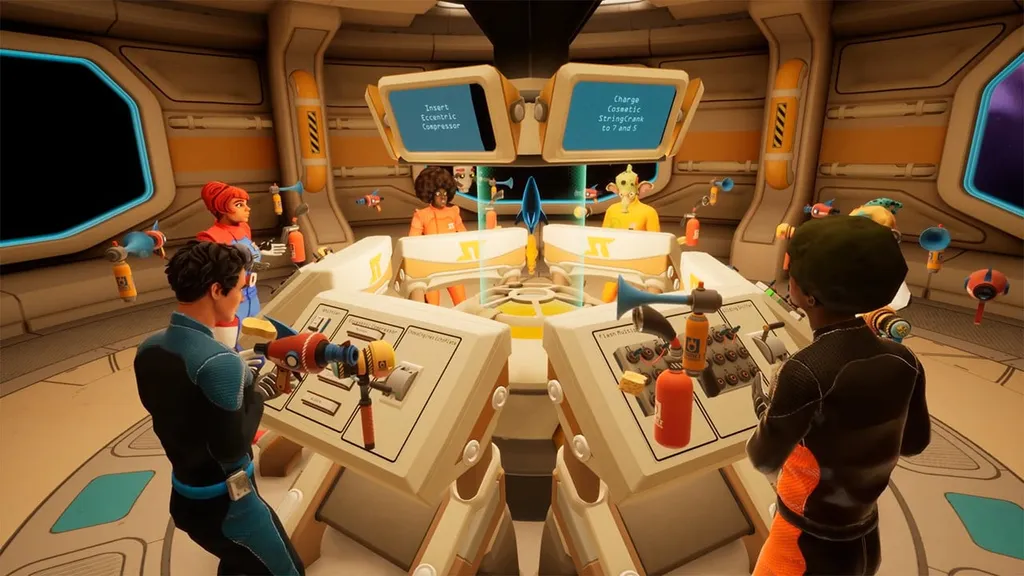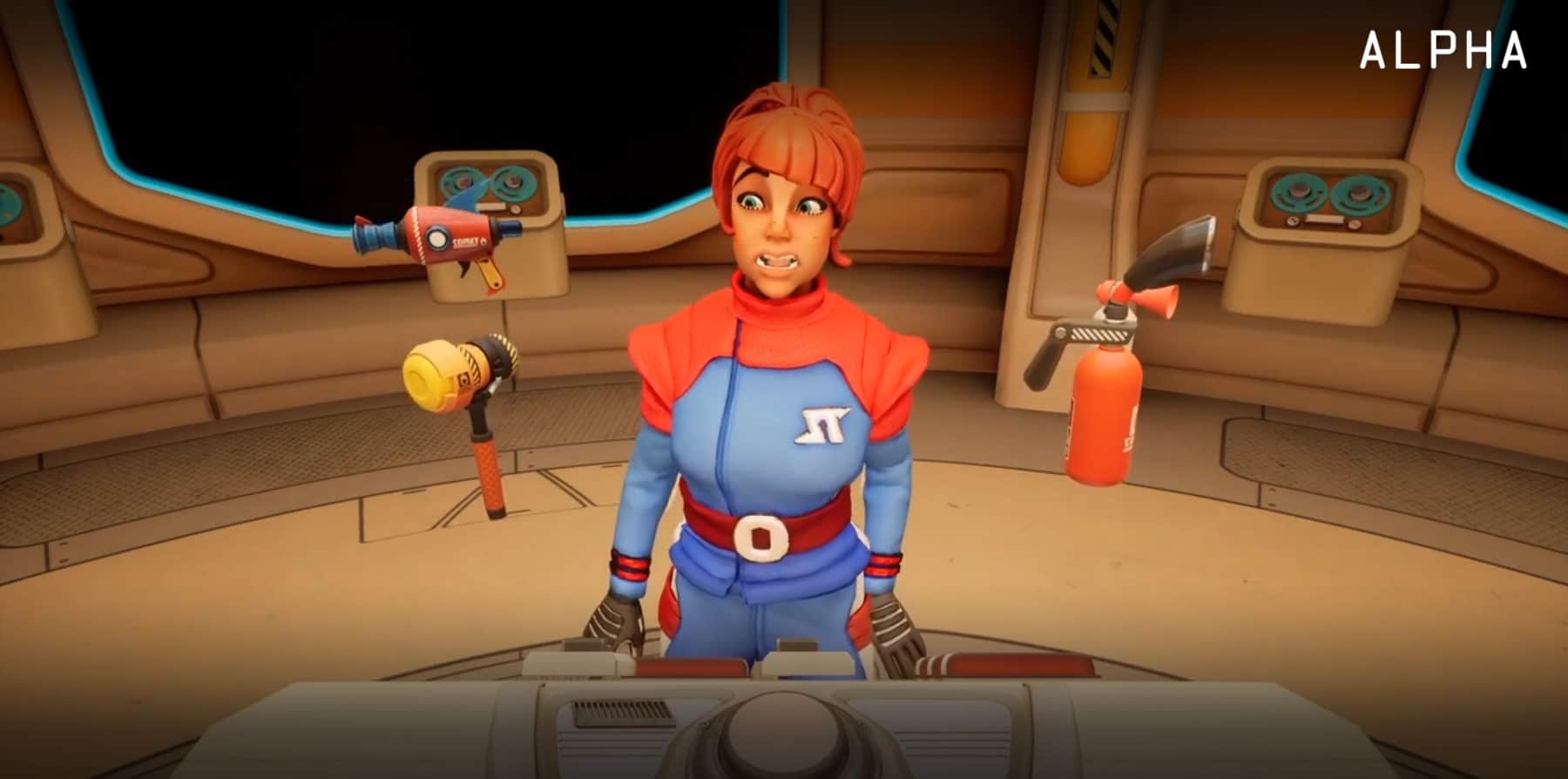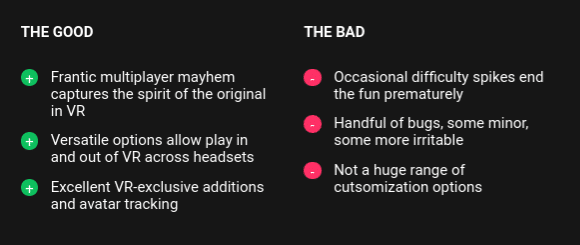In order to work, Spaceteam VR needed to be as human as possible.
No, I don’t mean that you shouldn’t choose to play as the long-trunked space elephant from the game’s avatar customization screen (if anything I’d recommend the opposite). I’m talking about further reducing the gap between our virtual presence and our real one.
It would all be very well to just put the 2012 mobile original — in which players bark increasingly ridiculous orders at each other to maintain a spaceship — onto consoles with online support, but you’d lose so much over the cold communication of faceless chat. A lot of what made Spaceteam a communal hit, one that I played hours of with friends that never play videogames, was that it was enjoyed in the same room, a congregation of people flinching when the pressure gets to overexcited crew members and identifying the weak link in a chain and shaming them for all to see.
Community is what would be missing and, while not perfect, Spaceteam VR does a great job of recapturing that uneasy camaraderie.
Much of the original game finds a natural home in VR. Spaceteam has up to six players surviving for as long as possible against the perils of the dark void. Every round, each player is given a control panel unique to them, filled with buttons to push, switches to flick and levers to pull. Above them sits a monitor issuing orders they’ll need to study. If said instruction relates to their panel, no problem, but if it doesn’t you’ll have to blurt it out in hopes that the relevant player hears you and follows your command.
Buried deep in the middle of the round, fires breaking out and alarms ringing in your ears, Spaceteam sets in a hypnotic spell. It ensnares you in a trance, screaming at best friends and leaving you wondering where this side of you has been hiding all these years.
Developer Cooperative Innovations uses VR to essentially extend the range from which that magic will work from the living room to the globe. The team’s in-house VR avatar system, Ikabod, is put to great work authentically tracking your movements and doing away with the awkward elbows and shrugged shoulders that have plagued social VR’s past. Paired with pitch-perfect character design, which paints rightly anxious expressions over a colorful cast of crew members, the game creates the right kind of reality you’d expect Spaceteam to exist in. It’s just a shame there aren’t more customization options to make your avatar truly feel like your own, though this will likely change over time.
Plus there are some brilliant additions unique to VR. Occasionally you’ll have to order everyone to stop what they’re doing and dance as frantically as possible to fill up a meter or, even better, some rounds will distort player’s voices, making orders harder to decipher (and yet so hilarious to receive that at one point I almost fell over from laughter). Many revolve around manic, accessible interactions, like using a hammer to repair broken panel parts, putting out fires with an extinguisher or shooting UFOs with a ray gun.
Much like your control panel towards the end of a tough round, though, Spaceteam is in need of a bit of a tune-up in some areas. At launch myself and other members of the Upload team encountered glitchy gameplay fairly regularly. Often these are small issues to do with the appearance of avatars and how they hold items. At other times, they’re fairly more game-breaking, like when starting a new match warps players to a spot in the level they can’t easily reach their panel from. Sometimes it’s a little difficult to tell if certain actions are actually working and, for all the excellent work with avatar animation, shouting over microphones inevitably causes more muffled confusion than playing locally.
If you do have the opportunity to play in the same room, though (let’s say in a few months from now maybe/hopefully), there’s an option to play with mobile players too. In fact this mode can even be taken online to play with friends that don’t have a headset. It isn’t as robust as the VR mode, but it’s an appreciated option to extend playability. Obviously if you’re more into solo play or don’t have a lot of people around to play the game with, Spaceteam isn’t the game for you.
The game does struggle with balance at times, though. There are three difficulties to choose from but, even on the easiest setting, it will occasionally throw so much at you at the start of a round that it’s practically decided to end the match itself. It’s frustrating to end a great run on an abrupt note, especially when it feels just beyond the small grasp of control Spaceteam gives you.
Spaceteam VR Review Final Verdict
Spaceteam VR is a proven formula on an unproven platform, which makes it a pretty fascinating experiment. Inevitably, some of the same-room companionship is lost in the transition from physical to virtual, but not nearly as much as you might think, and thoughtful additions made possible by headsets go a good way to making up for it. Spaceteam VR will break friendships, ruin your vocal cords and raise your blood pressure. That is to say, it’s quite a delight.
Final Score: 


 4/5 Stars | Really Good
4/5 Stars | Really Good




























